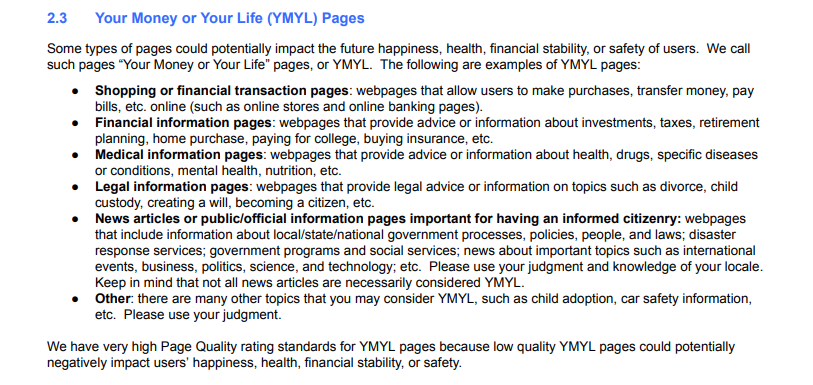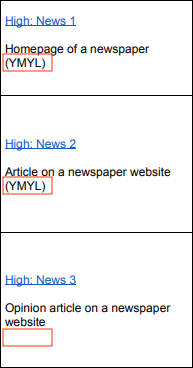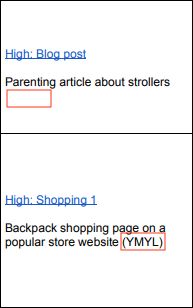What are Google’s ‘Your Money or Your Life’ Pages and What do They Mean for You?
What are Google’s “Your Money or Your Life” pages?
“Your Money or Your Life” pages (YMYL) is a Google term referring to pages that, Google deems, could impact “the future happiness, health, financial stability, or safety of users”. Ecommerce sites, medical sites, news websites and many others all fall under this YMYL bracket and are held to a higher “Page Quality” standard because of this.


The above is outlined in the latest Google Search Quality Evaluator Guidelines, correct at time of writing, July 2019. These guidelines are created (and fairly regularly updated) by Google and are given to their Search Quality Raters who use them to evaluate search results. The evaluations given by the Search Quality Raters do not directly impact rankings, but Google uses the feedback given to assess the success of various algorithm tweaks – which may or may not then roll out, depending on whether Google is happy with the results.
There is a lot of information held within these guidelines, which SEOs study to ensure they’re well versed on what Google expects from top-ranking pages. The YMYL element of these guidelines, especially recently, has been of particular interest. There has been an increasing focus on E-A-T (Expertise, Authoritativeness, Trustworthiness) as a ranking factor for Google after a number of updates seemed to focus on strengthening its importance, and the guidelines make it clear on numerous occasions that E-A-T is incredibly important when deciding how to rank a YMYL page. This is not the only thing to consider when creating and optimising a YMYL page, though.
Here we’ll analyse exactly how you can identify if your website counts as “Your Money or Your Life”, what standards you should, therefore, adhere to, and how to implement these standards to give yourself the best chance of ranking highly on Google.
Is My Site “Your Money or Your Life”?
In the guidelines, Google defines “Your Money or Your Life” pages in the following way:
“Pages [that] could potentially impact the future happiness, health, financial stability, or safety of users.”
A website owner must, therefore, ascertain whether pages on their site fall into any of those categories. There is no clear way to find out whether Google will be looking at your website with the higher expectations of “Your Money or Your Life”, as Google will not announce it or inform you. However, analysing the guidelines and applying it broadly will help you to make a judgement call. Compare, for example, the different classifications for news websites:


We can see that the homepage and an article on a newspaper website are both considered “Your Money or Your Life”, but an opinion article is not. The first two are relied upon to deliver quantifiable facts, whereas opinion pieces are not. Another example:


Here, the backpack shopping site is given YMYL status because it discusses products and handles customer transactions. Google states that a user needs “high quality information from authoritative sources when researching products” as it will involve the user’s finances. Therefore it must be regarded with higher scrutiny to ensure it’s safe and authoritative – not just because a user may input their card details, but also because the page aims to help a user make a decision about where to spend their money. Note that the parenting article is not considered YMYL. When reviewing the article, it is a news piece about the two sides of the arguments for and against strollers. The author does not offer advice based on this or give instruction, so it is not counted as YMYL. Instead, it clearly presents two different opinions.
As Google will neither confirm nor deny if your page is considered YMYL, we find it is best to err on the side of caution. The above examples can, however, be used as guidelines when assessing your website and its content.
A Guide to Strong “Your Money or Your Life” Pages
When analysing how to strengthen your YMYL pages, a good place to start is understanding E-A-T for SEO (Search Engine Optimisation). What exactly does E-A-T mean for your website?
What is E-A-T in SEO?
E-A-T is a measure of ‘quality’ for Google when looking at ranking websites. It stands for ‘Expertise’, ‘Authoritativness’, and ‘Trustworthiness’. Google’s algorithms look at your website with these elements in mind to determine how high in quality your page is and, therefore, where to rank you.
Expertise
This is about demonstrating your in-depth knowledge about your subject, which will show your expertise. You do this through your content mostly, and how well you communicate this knowledge to your audience.
Authoritativeness
Do you have the relevant credentials to be talking about your subject? This could be formal qualifications or demonstrable real-world experience that you present in your About page, Author Bio, or throughout your website. In addition, having other experts cite you and link to you builds your authoritativeness.
Trustworthiness
Reviews from real-life customers or clients; clear contact information for a real-world location and telephone number; a well-built website that does not break or 404 — all of these elements make you seem more trustworthy to Google.
Other YMYL Ranking Factors
E-A-T isn’t all that Google is looking at when it assesses your website for YMYL rankings. There are a variety of signals that Google looks for to determine your page quality, including but not limited to:
High-quality content
Content of over 1000 words, which is well written without grammar or spelling mistakes, and thoroughly covers your topic. To relate this back to E-A-T, keep in mind the E-A-T looks for who is responsible for the content, so an Author Bio is encouraged.
A positive online and real-world reputation
Google can and will look at independent rating websites to ascertain the reputation of your company and website, which can either help or harm your YMYL ranking, depending on your current reputation online. It’s important to note that Google states: “For a YMYL website, a mixed reputation is cause for a Low rating.”
Good resources including external links, FAQs, etc
This demonstrates to Google that you are well read on the subject, can explore it thoroughly, and are providing readers with as much information as possible. Satisfying the intent of the user, and going above and beyond where possible, is a strong ranking signal to Google.
A well-built website with a user-friendly design
Your website should have a good user experience and load quickly without broken elements, as this demonstrates that you are keeping it maintained and easy to use for a website visitor.
Contact and customer service information prominently displayed
Ensure you have accurate telephone numbers and contact emails displayed prominently so that real-life users can get in touch if they need to.
Up-to-date information, website health, and content
If you are using old sources or are writing in an industry that regularly changes (such as SEO!) you will need to keep your content fresh and up to date so that you are not providing people with outdated information. It’s important to keep in mind what Google says in its guidelines: “We have very high Page Quality rating standards for YMYL pages”.
Are you confident that your page is of the very highest quality, in expertise, user experience, and performance? If not, it’s time to plan improvements to make sure you’re going to be looked on favourably by Google, so that you can increase your rankings. If you’re struggling to work to Google’s many guidelines and algorithm updates, you can reach out to the professionals. Active Internet Marketing (UK) help many businesses improve their E-A-T for SEO along with tackling many other algorithm requirements to improve their rankings and overall website traffic. Contact us or give us a call on 0800 772 0650.
